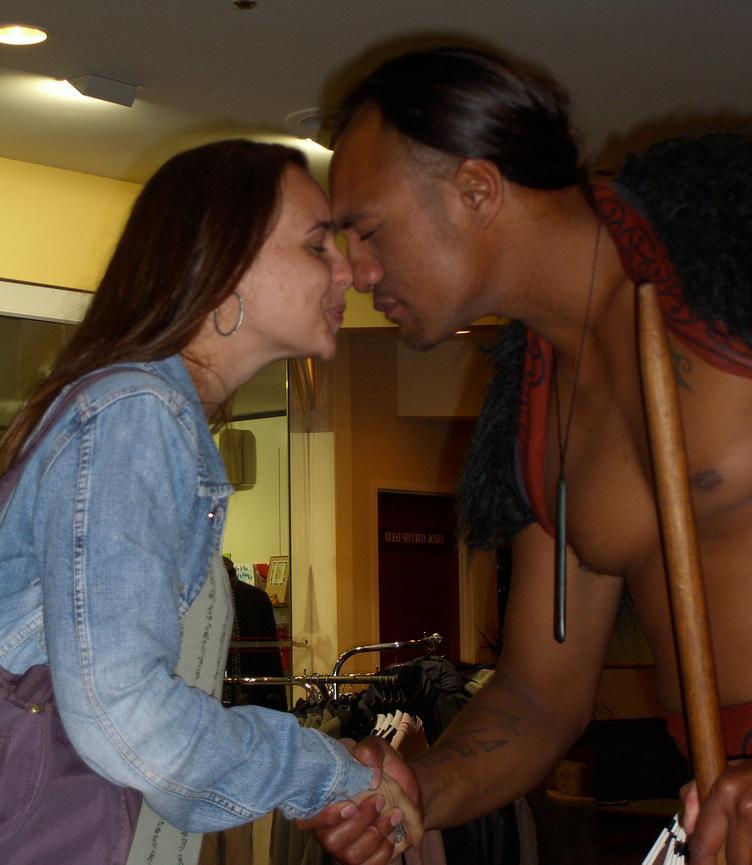Greeting Etiquette

Greeting Etiquette
The world has become smaller due to travelling and a growing multicultural impact on our society, and we are today more and more likely to meet people with a different cultural luggage than ourselves. The way we greet each other is an important part of our heritage and reveals a lot about cultural values. So, how should we greet a person with another cultural background than ourselves? Should we hug, kiss, shake hands, bow, or rub noses?
To a great extent, culture is about social codes. Many of these codes are hidden, even to ourselves. Throughout childhood and adolescence we adopt more and more of these codes from our environment, our parents, siblings, teachers, peers and role models. We store all this information in invisible 'backpacks' that we carry with us all our lives. This information expresses our culture's values and beliefs.
- What does our way of greeting people for the first time reveal about our culture?

In all cultures the first meeting with representatives from other cultures is crucial. First and foremost; is the 'stranger' a friend or a foe? Should we meet them with respect and warmth or anxiety or hostility? If this is the first friendly encounter, cultural expressions to signify this might vary a lot, but they always imply respect. Yet, the tricky question is: how do we show respect?
- How do you show respect when you greet someone?
- What do you consider as a disrespectful greeting?
A Norwegian school class was asked to compile a list of 10 important factors that could contribute to good communication. Shaking hands was ranked as the number one act in establishing a friendly atmosphere at a formal meeting.
This reveals a lot about the values intertwined in Norwegian teenagers' greeting etiquette. These values are invisible, even to ourselves, and revolve around respect, perception of genders, intimacy and degrees of formality.
- What does the shaking of hands in formal settings reveal about Norwegian culture?
- Are there any cultures where it is seen as disrespectful to shake hands among people you do not know?
Numerous psychological tests and experiments have confirmed that a stranger will form an opinion of you within a maximum of 60 seconds at your first encounter. As the saying goes: 'You will never get a second chance to make a great first impression.'
- Do you agree, is the first impression the most important?
- Do you think it is possible to change an unfavourable first opinion to a more favourable one?
Without doubt, the way we greet people we do not know, can open the doors to friendship and mutual understanding. However, the context matters a lot. What is considered formal and what is considered informal depends on cultural aspects. Furthermore, what is your role? Are you a guest or a host? As a guest; should you adopt the greeting rituals in your host's culture and stick to the saying: 'When in Rome, do as the Romans do'? The part of the host is not any easier; should you stick to your own ways or should you consider making adaptations to avoid offending your guest?
- Do you agree with the saying: 'When in Rome, do as the Romans do'?
- Why does context matter in intercultural meetings?
Intercultural competence is the ability to communicate with people from diverse cultural backgrounds. So, at a first meeting, you have a few seconds to make up your mind whether to kiss on the cheeks, shake hands, or make a solemn bow. Your choice will demonstrate if you are interculturally competent or not. Luckily, if you are going to travel, you most probably have time to prepare.
Discuss the 'Questions to ponder' found throughout the text with a partner or in a group.
Research unusual customs from around the world and make a quiz about them for your classmates. You may use a quiz tool like Kahoot.
Pick a country. What is considered polite in this country? Make a presentation where you explain some of the etiquette and rules of politeness in the country. What do you have to be aware of as a visitor?
Challenge yourself by choosing a country that you do not know well.
Links to website that may be useful:
Link to the webpage eDiplomat: 'Cultural Etiquette Around the World' (ediplomat.com)
Pick one of the tasks and write a longer text.
Write a short story about a first meeting that goes wrong. Give your text a suitable title.
Write a formal text where you discuss the importance of intercultural competence when studying or working abroad.
Did COVID-19 permanently change the way we greet others? Write a discussion text.